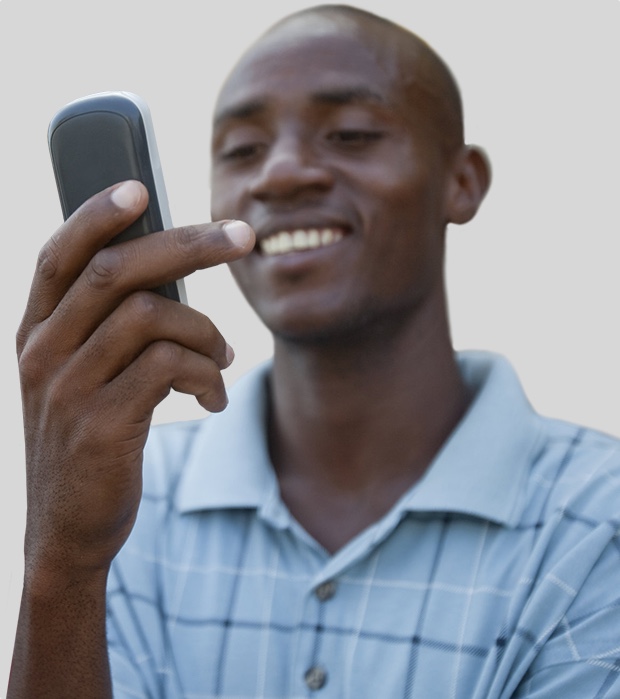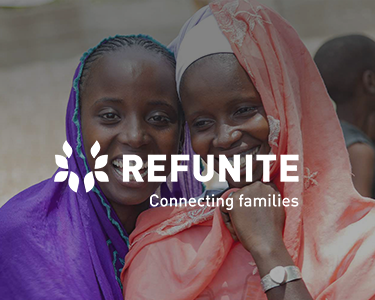
Carolyn Nash, Communications Coordinator, reports on her recent trip to Eastleigh, Nairobi.
March 3, 2014 — On a recent Friday morning, I met IT Director Julie Rix Bagger, on visit from Copenhagen, in Eastleigh, the oft-described “Little Mogadishu” of Kenya, to observe the door-to-door activities that our outreach team operates on a daily basis. Our guide, Refugees United (RU) Outreach Coordinator Farhiya Hussein, joined us just outside her home, flashing a relaxed smile as she prepared to do what she does everyday: register refugees in search of missing loved ones.
Farhiya, a Somali refugee herself who moved to Kenya when she was only a year old, has become adept at earning the trust necessary to register families. Most days Farhiya works alone. But last Friday, Julie and I accompanied her to answer a critical question: what could we learn from the experiences of refugees to help us refine our mobile application?
Together, the three of us entered an Eastleigh apartment complex. We watched Farhiya navigate a neighborhood familiar to her, speaking Somali to older women on a concrete terrace, elbow deep in washing. They bantered briefly and then offered directions to an apartment. With a mobile phone in Farhiya’s pocket, we followed the women’s directions to the third floor of the complex.
When an eighteen-year-old named Amal* answered the door, Farhiya introduced the three of us individually before explaining the Refugees United mission to reconnect separated families.
At the organization’s name, Amal nodded and smiled. She had moved to Eastleigh from Dadaab, the largest refugee camp in the world, located in northeastern Kenya, where word of Refugees United first reached her. She told Farhiya that she had lost touch with her father years ago. Then, trust earned, she invited all three of us inside.
In a back bedroom, Amal and Farhiya leaned together over a simple mobile phone. Farhiya motioned to Julie to join them.
“You have to register someone yourself,” she said. “If you want to learn.”
Farhiya asked Amal a series of questions: phone numbers, her father’s name, his clan, the place she last saw him, the city they are from, and his nickname. Julie typed Amal’s answers into the phone. In ten minutes, Amal was a registered user; her father was listed on the platform as a missing person.
Julie and I exchanged glances. While successful registrations are commonplace for Farhiya, watching families interact with the mobile application is the only way we can understand the user’s experience. With her innate openness, her clear explanations, and her Samsung Galaxy, Farhiya possessed all the resources she needed to secure the trust and access that will improve the likelihood of Amal finding her father.

But Julie and I were eager to answer our driving question: given that technology can always be improved, what could we learn from Amal’s experience to refine our tool and benefit our users?
Now registered, Amal searched for her father and received a flood of possible matches – all registered users who share her father’s first name. While Farhiya showed Amal how to scroll through and dismiss men who were too young or from different areas or clans, Julie watched the process through the eyes of an IT Director.
“We can make this more effective by weeding out people who don’t fit the profile exactly.”
Farhiya provided Amal with a brief demonstration that would allow her to return to the platform and continue her search as often as she likes, her odds improving each time more people join the mobile application. Currently, the Refugees United platform contains more than 280,000 profiles.
As Julie and I watched Amal navigate the screen, we could see the technological tweaks that might make the system more user-friendly. As we followed Farhiya to each apartment, encountering young mothers who took Farhiya’s number and explained that, though they were missing family members, they would only engage with RU once they have secured their husband’s permission, we learned the cultural nuances that influence how successful any given day of door-to-door outreach can be.
For Julie and me, the hours spent with Farhiya will help us determine how best we can modify the work we do in our offices to better assist the families who use our platform. From technology literacy to religious ritual, watching refugee families both successfully use and occasionally struggle with our mobile tool allows us to create a more nimble and adaptable mobile application.
Photo above: Outreach Coordinator Farhiya Hussein assists a refugee in registering on Refugees United’s mobile application.
*Name changed


